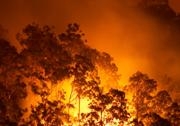Indigenous burnoff culture a myth
The arrival of the first people in Australia some 50,000 years ago did not result in significantly greater fire activity, according to landmark research on the continent's fire history
The arrival of the first people in Australia some 50,000 years ago did not result in significantly greater fire activity, according to landmark research on the continent's fire history

The arrival of the first people in Australia about 50,000 years ago did not result in significantly greater fire activity, according to a landmark research report on the continent's fire history going back 70,000 years.
Despite a widely held belief that the frequent use of fire by Aboriginal people resulted in vegetation change and other environmental impacts in prehistoric times, the most comprehensive study of Australian charcoal records has found Indigenous people had no major impact on fire regimes.
The arrival of European colonists after 1788, however, resulted in a substantial increase in fire activity, according to the report by an international team of 19 scientists led by palaeoecologist Dr Scott Mooney, of the UNSW School of Biological, Earth and Environmental Sciences, and published in the journal Quaternary Science Reviews.
On large time scales, overall fire activity in Australia predominantly reflects prevailing climate, with less activity in colder glacial periods and more in the warmer interglacials, the study found.
"Ideas about prehistoric fire continue to influence debates concerning natural resource management, with suggestions that Aboriginal-like fire management - that is, frequent and low-intensity fires - could prevent some of the massive bushfires we have seen in modern times in Australia," says Dr Mooney.
Read the full story at the Faculty of Science newsroom.
Media contacts: Scott Mooney | 02 9385 8063 | Bob Beale - UNSW Faculty of Science | 0411 705 435